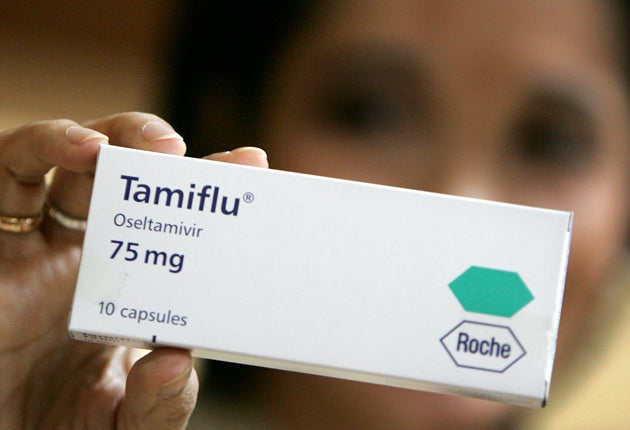Dozens fall victim to side effects of swine flu drug
UK drugs agency reveals 150 people have reported mild reactions to Tamiflu

The agency that licenses medicines in Britain has received 150 reports of suspected adverse reactions to the Tamiflu treatment for swine flu. The figure was released yesterday as GPs said some patients were choosing not to take the drug because of concern about the possible side effects.
The Medicines and Healthcare Products Regulatory Agency (MHRA) said the 150 reports received within the UK up until 23 July mention 241 separate side effects, most of which were mild and already recognised as linked with the anti-viral drug.
They include "mild allergic and gastrointestinal events", such as diarrhoea and vomiting. There were five reports involving nine suspected adverse reactions to Relenza, the rival drug to Tamiflu which is taken by inhalation and is less widely used.
The MHRA has allocated a dedicated section of its website to receive reports of side effects to Tamiflu from doctors and the public, in order to spot any developing trends. A spokesman said: "Obviously there are a lot more people taking Tamiflu and Relenza, so we set up a specific site people can go to to report any potential side effects so we can monitor its safety. A report of a reaction does not mean it has been caused by the drug in question – a mere suspicion will suffice. We are very keen to promote this. We want the public to know about it and use it."
One case of a suspected fatal reaction involving a patient who suffered liver failure after taking Tamiflu, was later attributed to hepatitis.
The MHRA said previous reports from outside the UK had suggested a link between Tamiflu and liver failure but none had shown a causal link. "Hepatic adverse events remain under close monitoring," the spokesman said.
A second report of a fatal reaction was being investigated, he said.
Doctors said the number of adverse reaction reports was tiny in the context of the tens of thousands of patients who have been prescribed Tamiflu. The Government estimated there were 100,000 new cases of swine flu last week. The commonest side effects of Tamiflu are diarrhoea, nausea, stomach pain and vomiting.
Doctors yesterday backed the advice of the Government's Chief Medical Officer, Sir Liam Donaldson, that swine flu patients should be offered anti-viral drugs, but added that they had a choice to take them or not.
Richard Vautrey, a GP in Leeds, said: "In my experience, when patients are reassured about the likely pattern of their illness and the possible side effects of the drugs, they decide they are better off not taking them."
Laurence Buckman, chairman of the British Medical Association's GPs committee, said: "If you have a child with flu and then they get diarrhoea and vomiting and become confused where they weren't before, that upsets the parents and creates more work for the doctor. Where someone doesn't have an obvious need for Tamiflu, because they are healthy and have swine flu mildly, you have to ask whether it is worth taking in this circumstance."
Dr Buckman said there was an urgent need for calm in the face of what one virologist had called "the weakest pandemic the world has ever seen".
"We must not underplay it, but we also must not overplay it as a medieval plague," Dr Buckman said.
Professor Terence Stephenson, president of the Royal College of Paediatrics said paediatricians were concerned the NHS could be overwhelmed by patients without the virus. "If a third of the population get the virus and parents go to A&E with their children we will be inundated. For the vast majority this remains a mild illness. We want to have the resources to deal with children who need our help," he said.
Professor Stephen Field, chairman of the Royal College of General Practitioners, said: "We have got to try and get the message across that for most fit and healthy people, swine flu won't cause much harm."
Of 58,000 people assessed by the National Pandemic Flu Service on its first day last Thursday, less than one in 10 had symptoms of swine flu and were issued a prescription for Tamiflu.
Tamiflu The side effects
*Common: nausea, vomiting, diarrhoea, stomach ache and headache. Usually cease after first dose.
*Less common: a feeling of fullness, bleeding in the gut, bronchitis, dizziness, tiredness, sleeping difficulties, skin reactions, mild to severe liver function disorders, visual disturbances and heart rhythm abnormalities. These can also be caused by influenza.
*Neuropsychiatric events have also been reported, including convulsions and delirium, confusion, abnormal behaviour, delusions. These can also be caused by influenza.
Subscribe to Independent Premium to bookmark this article
Want to bookmark your favourite articles and stories to read or reference later? Start your Independent Premium subscription today.

Join our commenting forum
Join thought-provoking conversations, follow other Independent readers and see their replies